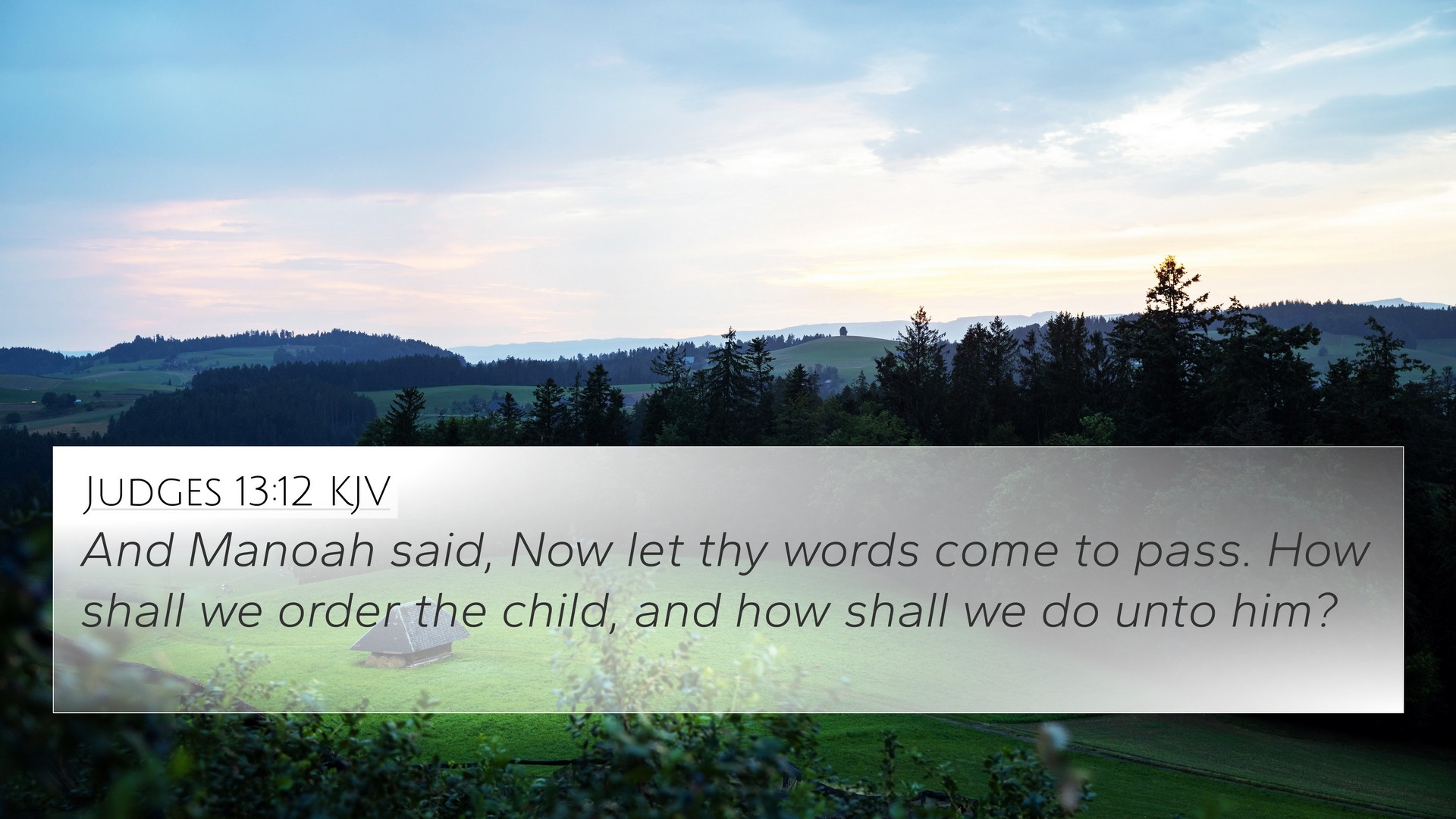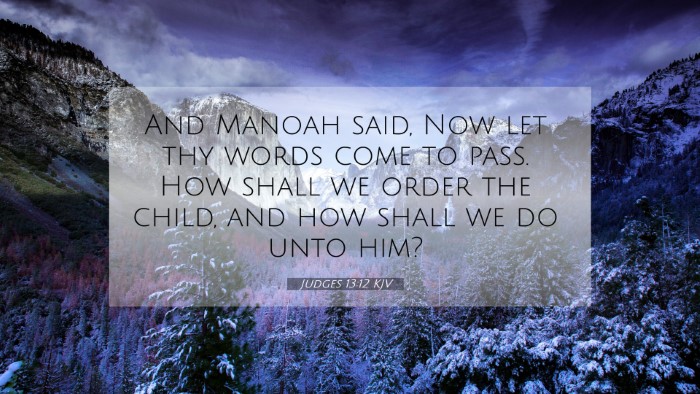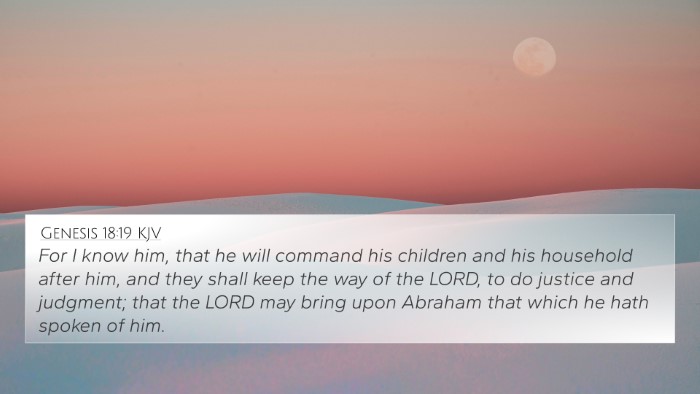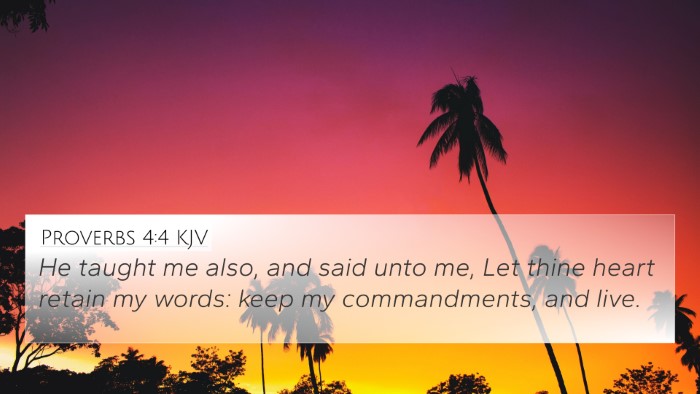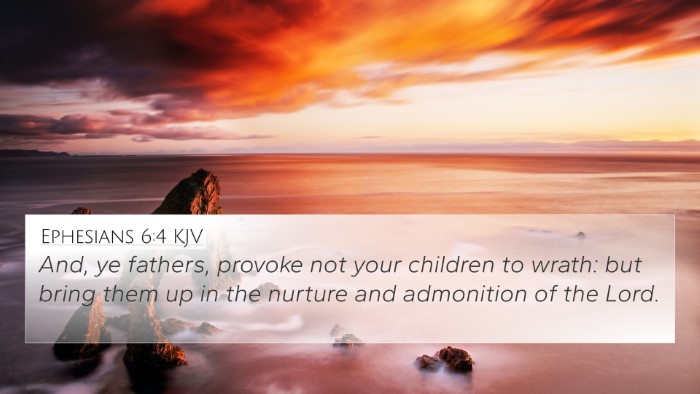Meaning and Interpretation of Judges 13:12
Judges 13:12 presents a significant moment in the narrative surrounding the birth of Samson, where Manoah, the father of Samson, engages in a dialogue with the angel of the Lord regarding the future of his son. The verse reads:
"And Manoah said, Now let thy words come to pass: how shall we order the child, and how shall we do unto him?"
Summary of Insights from Commentaries
This verse illustrates the earnestness of Manoah’s inquiry into the divine instructions regarding his son. Public domain commentaries provide a rich tapestry of insights:
Matthew Henry's Commentary
Matthew Henry suggests that Manoah's questions stem from a desire for clarity and obedience to God's will. His inquiry reflects a deep responsibility as a parent and a commitment to raising his child according to divine direction. Henry emphasizes the importance of understanding God's purpose for one's life, especially in the formative years.
Albert Barnes' Notes on the Bible
Albert Barnes interprets this verse as a demonstration of Manoah’s faith and concern for his child's upbringing. He notes that Manoah’s request for guidance indicates his recognition of the angel's authority and the significance of Samson’s role as a future deliverer of Israel. Barnes highlights the need for parents to seek divine wisdom in directing their children's lives.
Adam Clarke's Commentary
Adam Clarke elaborates that Manoah's query signifies a typical human desire for explicit instructions in the face of unknown futures. Clarke emphasizes that this moment demonstrates Manoah’s proactive approach to parenthood, which serves as a model for all parents seeking divine guidance. Additionally, Clarke indicates that the name of the child - Samson - is significant and carries the burden of his destiny.
Cross-Referencing the Verse
This verse connects to several themes across the Bible regarding divine guidance, parental responsibilities, and the preparation of a chosen one:
- Luke 1:13-17 - The message to Zechariah about John the Baptist’s future role.
- Proverbs 22:6 - Training up a child in the way he should go.
- 1 Samuel 1:11 - Hannah's vow concerning the upbringing of Samuel.
- Galatians 4:19 - Paul’s depiction of his concern for the spiritual well-being of his children in faith.
- Exodus 13:14 - The importance of teaching children about the Lord's works.
- Ephesians 6:4 - Instruction for fathers to bring up their children in the nurture and admonition of the Lord.
- Isaiah 49:5 - The Lord has formed a servant from the womb to bring Jacob to Him.
Thematic Connections
The thematic connections between Judges 13:12 and these cross-references emphasize:
- Parental Guidance: The verse highlights the importance of intentional parenting, guided by divine principles.
- Divine Purpose: Similar to other biblical figures, Samson’s story illustrates God's plan for individuals from before their birth.
- Spiritual Legacy: Each of these references reflects the vital role of instilling faith and values in the next generation.
Understanding Through Context
When exploring the meaning of Judges 13:12 through biblical cross-references, one sees the depth of its message regarding:
- Responsibility of Raising Children: Parents are called to model faith and commitment to God's teachings.
- Seeking God's Guidance: Manoah reflects the importance of seeking divine insight for life decisions.
- The Continuity of God's Promise: This verse reinforces the ongoing narrative of God’s guidance and promise throughout Scripture.
Conclusion
Judges 13:12 serves as a poignant reminder for parents and believers about the significance of divine guidance in one's life journey. Through the insights provided by commentaries and the thematic connections to other scriptures, one can appreciate the holistic view of raising children within the faith framework. The act of seeking God’s will, as shown by Manoah, encourages a proactive and trust-filled parenting that resonates throughout the Biblical narrative.
